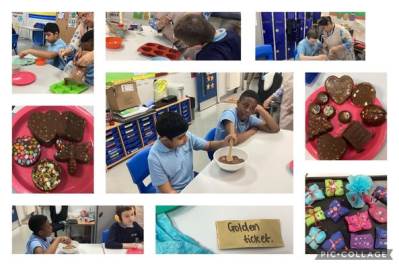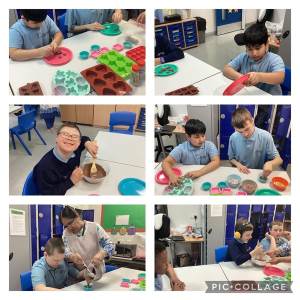English KS3
Fairy tales are more than true: not because they tell us that dragons exist, but because they tell us that dragons can be beaten
Neil Gaiman
Curriculum Vision
In English at New Bridge School we are committed to helping pupils develop their reading ability and explore different learning styles. We understand that every pupil has unique individual needs, and we strive to tailor our lessons to meet those needs effectively.
At New Bridge School, we believe that a strong foundation in English is essential for academic success. By focusing on pupil's reading ability, we aim to enhance their overall understanding of language and communication. Our teachers are trained to identify and accommodate different learning styles, ensuring that each pupil receives the support they need to thrive.
We recognise that every pupil learns at their own pace and in their own way. By catering to individual needs and preferences, we create a nurturing environment where pupil's can flourish. Our English curriculum is designed to be engaging and interactive, allowing pupil's to explore different aspects of language and literature while developing their reading ability.
At New Bridge, we believe that a high-quality education in English will unlock students’ ability to communicate their ideas, emotions, and needs to others and engage unreservedly in the world around them. Pupils can develop culturally, emotionally, intellectually, socially, and spiritually through reading which is one of our 3 key areas of study: speaking & listening, reading, and writing.
Pupils are the heart and soul of everything we do, and we want them to participate fully in society by learning how to communication through; speaking, reading, and writing to the best of their ability.
English Lessons at Keystage 3
English is taught thematically over five lessons per week, from the pre-key stage standards through to the National Curriculum. Pupils are assessed in year 7 and then at regular intervals to ensure they are working at the stage they can access and with the appropriate level of challenge to help they progress.
Reading
Pupils are assessed regularly to inform pupils’ starting point on our reading scheme and to ensure they are appropriately challenged in their learning.
All students in the Main Body will benefit from our Whole School Approach:
Our intention is that pupils will:
- Be prepared to read more challenging texts,
- Read a balance of non-fiction and fiction texts,
- Respond with purpose to a variety of texts.
New Bridge school have developed a bespoke reading approach referred to as Reading Routes. There are a series of Routes and each one provides a structured approach with appropriate technology, reading schemes and interventions. Pupils are assessed regularly to ensure they are on the Route that they can access and that provides sufficient stretch and challenge to enable them to progress in their reading. We recognise that some pupils can be reluctant readers and to encourage them to engage in reading for enjoyment, all pupils have access to ebooks/audio books through a range of apps.
Find the Reading Intent below:
reading at new bridge school ks3 ks4.pdf
Writing (spelling and handwriting)
Handwriting is explicitly taught, through teacher modelling and the use of writing Apps on the iPads which are specially created to support the correct letter and number formations. We support pupil's to improve their spelling through fun and engaging activities.
Pre-writers use roll and write, sand and finger games; in addition to iPad letter formation apps such as ABC Star.
Spelling and handwriting can be a barrier to creating a piece of work that demonstrates a pupil’s ability. To support pupils we offer adaptations such as pencil grips alongside technology to support pupils to draft and edit written text. Pupils can use Spellzone and follow an individualised programme, which is accessed daily.
Speaking & Listening
At New Bridge School, we place a strong emphasis on developing our pupils' speaking and listening skills. Through engaging activities and class discussions, we encourage pupil's to express themselves confidently and articulately through their preferred communication methods.
Questioning is a key component of our English curriculum. We teach our students how to ask thoughtful and thought-provoking questions that deepen their understanding of the texts they are reading. This skill is essential for critical thinking and analysis.
Class discussions are a regular feature in our English lessons. pupil's are encouraged to share their opinions and ideas with their peers in a respectful and supportive environment. These discussions help foster communication skills and promote collaborative learning. Pupils are encouraged to take part in a variety of activities which they record using their iPads to support self and peer assessment.
Teachers use a wide repertoire of activities to create real dialogue and depth of thought within classroom discussions. These include:
- Teacher-pupil talk
- Pupil-pupil talk
- Questioning
- Role play
- Hot seating
English is sequenced throughout all Keystages.
Gallery
English (KS3)
Pupil Voice
Miss makes our lessons fun and interesting
I love the different stories we read from around the world






